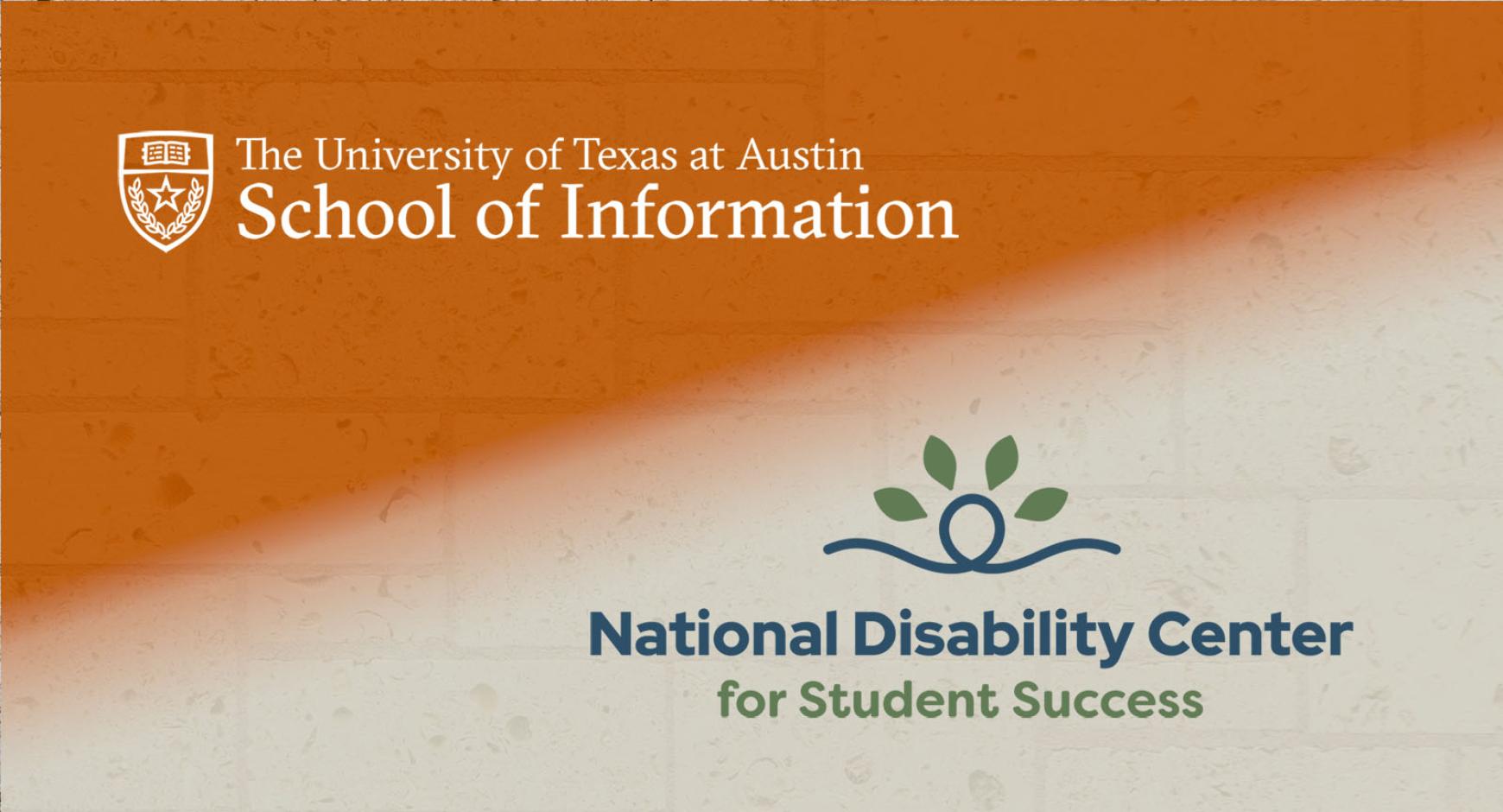
The School of Information is well-represented in a new national initiative to improve outcomes for millions of disabled students on U.S. campuses. The mission of the National Disability Center for Student Success at The University of Texas at Austin is to provide the first comprehensive and actionable research to support disabled student experiences and achievement after high school. Andrew Dillon, V.M. Daniel Professor of Information and dean of the iSchool from 2002 to 2017, is co-investigator of a $5 million grant from the Institute of Education Sciences and is the National Disability Center’s Director of Research Dissemination. He serves on its leadership team alongside principal investigator and Executive Director Stephanie W. Cawthon from the College of Education.
iSchool expertise in user-centered design and socio-technical systems will help the National Disability Center deliver useful, usable, and accessible tools to improve learning experiences and outcomes.
“Shaping a better educational infrastructure to serve all students is a core value of information scholars and researchers, and a particular focus of my own work,” said Dillon. “iSchool expertise in user-centered design and socio-technical systems will help the National Disability Center deliver useful, usable, and accessible tools to improve learning experiences and outcomes.” Studies show disabled students find colleges and universities to be unwelcoming and unaccommodating places. Disabled students report encountering high levels of ableism, discrimination, and bullying. These experiences are one of the key reasons they do not disclose their disabilities, making it harder for higher education to understand the true scope of the issue and provide the necessary support.
Joining Dillon in the interdisciplinary effort is iSchool Assistant Professor Earl Huff, Jr., who is on the center’s faculty team for research collaboration, and iSchool alumna Gayathri Ramesh, MSIS ’23, who is a consultant with experience from Cawthon’s pilot study of a collaborative model focused on access and equity — a study that Dillon also participated in and which was foundational for the creation of the National Disability Center. “The chance to serve on the leadership team with Stephanie and others is exciting and challenging, and my belief that this center can make a significant, positive difference in the educational experiences of all disabled students is both professionally and personally meaningful to me,” said Dillon.
“As information science rapidly expands in this digital age, insights and collaboration from iSchool colleagues is absolutely critical to our research,” said Cawthon. “I am grateful and our teams are thrilled to be working alongside Andrew, Earl, and Gayathri, as we all work to shift the ways disability is perceived and experienced on college campuses.”
As a member of the National Disability Center’s Faculty Cadre, Huff will collaborate with colleagues from five different colleges at UT Austin and work on research projects with Student Fellows, who gain innovative training and mentoring experiences. “The interdisciplinary nature of the National Disability Center is an unprecedented opportunity for many of us,” said Huff. “We can work together to understand the needs of disabled students and young adults, then devise systems, strategies, and communications that are more accessible and equitable.”
The Centers for Disease Control and Prevention estimate that up to 1 in 4 (or 27 percent) of adults have at least one type of disability. That means over 4 million college students in the U.S. have a disability — including apparent disabilities, such as a person using crutches, and ones that are non-apparent, such as autism or depression — and studies show they face barriers that make them less likely to persist in their studies, graduate with degrees, and achieve their career goals. The first research priority for the National Disability Center is to create a rigorous new research measure of perceived campus accessibility — an essential first step to help determine demographic predictors and the relationship to disabled student outcomes — by focusing on the core issues of accessibility, disclosure, student supports, institutional culture, and student outcomes.
About Andrew Dillon
Dillon studies psychological aspects of the human response to information technology. Prior to joining the faculty of UT Austin, he was a founding member of the School of Informatics at Indiana University. The author of more than 100 articles and books on various aspects of information behavior and design, Dillon has received research funding from NSF, Microsoft, and CEC, among others. He is this year’s recipient of the Award of Merit from the Association for Information Science and Technology for significant contributions to the field of information science.
About Earl Huff, Jr.
Huff has conducted research in understanding the needs of vulnerable and underserved populations such as marginalized racial and ethnic groups, people with disabilities, and aging adults to design more inclusive, equitable, and accessible information and communication technology (ICT). His current research examines how online learning (e-learning) and supporting technologies can be (re)designed to be accessible for people with disabilities and aging adults. Huff co-directs the Research on Equity, Access, and incLusIon in Technology and societY Lab (REALITY Lab), which researches the influence of data, information, and technology on equity in society. Huff is part of the Provost’s Mentored Faculty Scholars Program at UT Austin for tenure-track faculty with strong scholarly records and a commitment to equity.
About Gayathri Ramesh
Ramesh is a UX designer at the HathiTrust, a partnership of academic and research institutions that digitizes and preserves millions of books. She earned her Master of Science in Information Studies from the iSchool in 2023, with a specialization in UX Research and Design, during which time she also worked on two accessibility initiatives, the Collaborative for Access and Equity and UT Austin’s Ally Accessibility Platform.
About the National Disability Center
Launched in 2023, National Disability Center provides actionable research and strategies to help colleges, universities, and training centers build their capacity to support millions of disabled students — to improve inclusion in higher education programs, boost degree completion efforts, and increase readiness for the workforce. It is housed at the Texas Center for Equity Promotion at The University of Texas at Austin. nationaldisabilitycenter.org
